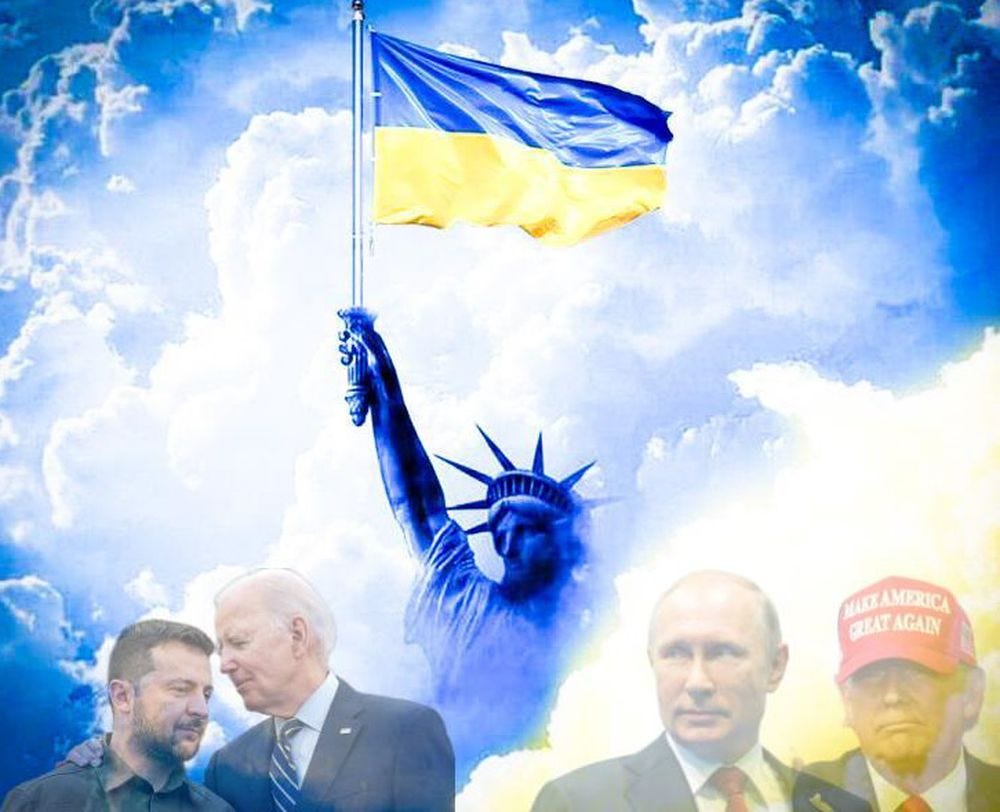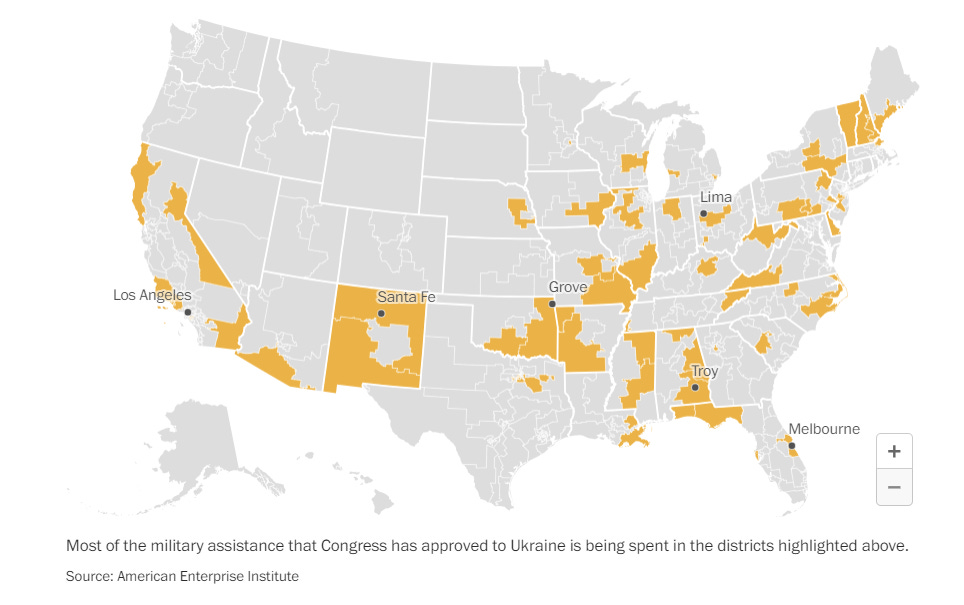Notes on the Context of the Ukraine-MAGA-Russia Congressional Showdown
The only clear winner is the military/industrial complex. (But not so much in San Diego)
After six months of dawdling, the House of Representatives got around to voting on foreign aid legislation this past weekend. There are many aspects and more than a few add-ons to what got through, but for purposes of this post I’ll be focused on the aid to Ukraine.
The House passed the Ukraine Security Supplemental Appropriations Act on Saturday with a vote of 311-112. Democrats cheered and waved Ukrainian flags as they unanimously supported the measure. A majority of Republicans voted against it, hiding behind bogus claims about border security. The GOP minority voting for aid were called traitors.
One of the bills would provide nearly $61 billion to assist Ukraine and others in the region opposing Russia. Of that total:
about $23 billion would be used to replenish US weapons, stockpiles and facilities
more than $11 billion would fund current US military operations in the region.
nearly $14 billion included in the bill would help Ukraine buy advanced weapons systems and other defense equipment.
About half the appropriation will be spent within the confines of the US as defense contractors shore up stockpiles. (San Diego is not set to benefit in a big way)
Comparisons to the WWII-related dealings of British Prime Ministers Neville Chamberlain and Winston Churchill abounded as the aid measure moved through the House of Representatives.
Texas GOP Rep. Michael McCaul appeared on ABC’s “This Week”, saying:
“I think they bought into this notion that it’s an either or proposition: You can’t secure the border, you can't support Ukraine without the border. We can do both. … The eyes of the world are watching, and our adversaries are watching, and history is watching. And that’s what I kept telling my colleagues: Do you want to be a Chamberlain or a Churchill? Because that is the moment in time that we are at.”
Was MAGA the loser here? Steve Inskeep says the vote proves the system can work in trying circumstances. I think the situation is way more complicated.
David Frum, writing at the Atlantic, noted the changing U.S. political dynamic, referring to the Ukraine vote:
“On something that mattered intensely to [Trump]—that had become a badge of pro-Trump identity—Trump’s own party worked with Democrats in the House and Senate to hand him a stinging defeat. This example could become contagious. Ukraine won. Trump lost.”
The larger picture is that anti-MAGA Republicans and Democrats took advantage of a perceived crack in Trump’s armor. Despite herculean efforts to avoid or delay a trial, Dear Leader is now sitting in a courtroom with no choice but to do as he is told by the judge while potential jurors have expressed their dislike of him to his face.
New York attorney general Letitia James asked a judge last week to void the $175 million appeals bond Trump posted to secure the $454 million judgment against him in the business fraud case. She says that the defendants have failed to show that there is enough collateral behind the bond to secure it. She has asked for a replacement bond within a week. Without a bond, James can begin to seize Trump’s property.
I’d also say there are other things working against the MAGA faithful’s nightmare for America, in particular the reverberations of a UAW organizing victory in Tennessee, and a lack of unity within the GOP on future steps since the Dobbs decision. But it ain’t over ‘till it's over, and the struggle against various forms of authoritarianism has been ongoing for more than a few decades.
Republican opposition to military aid in Ukraine dates back to the platform adopted at the 2016 GOP convention. From the Washington Post
The Trump campaign worked behind the scenes last week to make sure the new Republican platform won’t call for giving weapons to Ukraine to fight Russian and rebel forces, contradicting the view of almost all Republican foreign policy leaders in Washington.
Throughout the campaign, Trump has been dismissive of calls for supporting the Ukraine government as it fights an ongoing Russian-led intervention. Trump's campaign chairman, Paul Manafort, worked as a lobbyist for the Russian-backed former Ukrainian president Viktor Yanukovych for more than a decade.
Still, Republican delegates at last week’s national security committee platform meeting in Cleveland were surprised when the Trump campaign orchestrated a set of events to make sure that the GOP would not pledge to give Ukraine the weapons it has been asking for from the United States.
In 2020, the GOP Convention produced no platform. From The Hill:
The absence of an updated Republican party platform for the 2020 election is allowing President Trump to avoid hard commitments on the sensitive foreign policy issue of Ukraine, where his withholding of $400 million in military assistance was at the heart of his impeachment by the House.
The GOP’s decision to preserve the 2016 platform keeps in place toned down language related to Ukraine that was negotiated at the time by Trump’s then-campaign chairman Paul Manafort, who is serving a seven and a half year prison sentence on charges brought by special counsel Robert Mueller’s investigation into Russia’s interference in the U.S. elections.
Manafort, who was found by the Senate Intelligence Committee to have had direct contacts with Russian intelligence officials during the 2016 campaign, successfully removed any commitments to lethal military assistance to Kyiv as part of efforts to soften language towards Moscow.
The former President believes that the hacking of the Democratic National Committee was actually done by Ukraine, which wanted to frame Russia for the act. His first humiliation as president was getting caught trying to persuade that country’s leader to assist him in gathering evidence of Biden family corruption in exchange for financial aid.
One part of the influence of Vladimir Putin on the Republican Party can be traced to what former McCain campaign advisor Steve Schmidt called “the K Street sewer firms where Roger Stone, Rick Gates, Paul Manafort and Rick Davis thrived.”
Senator John McCain turned a blind eye to the dealings of his top adviser, Rick Davis, who was making millions of dollars with his partner, Paul Manafort. Manafort was advancing the interests of the Russian Federation in Ukraine and across Eastern Europe. They worked for the Putin puppet Victor Yanukovych and Russian oligarch Oleg Deripaska. They advanced Russian interests from the Maidan to Montenegro. John McCain spent his 70th birthday with Oleg Deripaska and Rick Davis on a Russian yacht at anchor in Montenegro.
Rick Davis picked the walking disaster known as Sarah Palin to be McCain’s running mate. And eight years later, Manafort would choose Mike Pence to be Trump’s.
It’s my analysis that the Russians have for years sought to recruit and place agents and useful idiots on the staff of legislators in Washington. They’re certainly not the first country to come up with the concept.
Rachel Maddow’s book Prequel: An American Fight Against Fascism tells the story of the efforts of pro-Nazi Americans to spread German propaganda with the hopes of dividing our country to keep it out of World War II and to possibly soften it up for a future takeover by Adolph Hitler.
I’m not saying right wing politicians are necessarily Putin’s puppets; it’s also true that the MAGA infection of the GOP has led to a great deal of sympathy for authoritarian leaders and a desire to do their bit in undermining democracy.
Molly Olmstead quotes Thomas Rid, a professor of strategic studies at Johns Hopkins, warning against giving the Russians too much credit for swaying American public opinion.
It’s important, he argued, not to blame misinformation, isolationism, and other factors that led to changing views of the war on external actors alone. Americans, Rid said, are “perfectly capable of coming up with crazy ideas.”
Take Sen. Tommy Tuberville’s claim about why Putin needed to invade Ukraine. Speaking to a right-wing Alabama website, Tuberville said: “It’s a communist country, so he can’t feed his people, so they need more farmland.”
The claim—coming from a man who couldn’t name the three branches of American government and who thought World War II was fought over socialism—seems to be pure, homegrown nonsense.
Leading up to last Saturday’s vote, the purported influence of Russia in the GOP became an item for public discussion. Georgia Representative Marjorie Taylor Greene’s almost verbatim quotes about Ukraine waging a “war against Christianity” and Russians “seem to be protecting” the religion earned her the nickname “Moscow Marge” in some quarters.
You have to give the Biden administration credit. Through a series of briefings led by military and intelligence officials they were able to convince the House Speaker of the moment Mike Johnson to break the logjam on voting for military assistance.
Greg Sargent’s New Republic article “Mike Johnson’s Shockingly Pro-Ukraine Speech Really Sticks It to MAGA” explains the significance.
“I really do believe the intel and the briefings that we’ve gotten,” Johnson said, in a moment that became a mini-speech. “I think that Vladimir Putin would continue to march through Europe if he were allowed. I think he might go to the Balkans next. I think he might have a showdown with Poland, or one of our NATO allies.” If so, he added, we might find ourselves sending troops to defend allies from Putin later.
Did we really hear the speaker say that he believes what our intelligence services have told him about the long-term consequences of cutting off aid to Ukraine?
This is a direct challenge to the MAGA worldview in multiple ways. Johnson is treating Putin as the aggressor in the Russia-Ukraine conflict and acknowledging his broader imperialist designs, which is heresy to some MAGA Republicans. But he’s also flatly declaring that on these matters, the deep state is very much to be believed.
So here we are; the Russians are (again) the bad guys and their agents have thoroughly infiltrated western style democracies/republics with the goal of weakening them from within. Brave people in Ukraine who are fighting to save their homeland asked for help, and GOP legislators in the land of the free were too busy fighting with each other to be bothered.
This has always been a lopsided conflict, with Russian military, economic, and political might as the heavyweights. The initial success of Ukraine holding its ground can be attributed to foreign intelligence services, morale in Kiev and the utter corruption of the Russian military / industrial complex. Three years of fighting have diminished the resources of the defenders and there were more than a few accidents involving falling out of windows on Moscow’s side.
There are analysts who say that Ukraine’s diminished defensive capability may have brought the war to a turning point.
From PoliticoEU:
Increasingly it looks as if Putin’s bet that he can grind down Ukrainian resistance and Western support might pay off.
Without a major step-change in the supply of advanced Western weapons and cash, Ukraine won’t be able to liberate the territories Putin’s forces now hold. That will leave Putin free to gnaw on the wounded country in the months or years ahead. Even if Russia can’t finish Ukraine off, a partial victory will leave Kyiv’s hopes of joining the EU and NATO stuck in limbo.
The ramifications of such an outcome will be serious for the world. Putin will claim victory at home, and, emboldened by exposing Western weaknesses, he may reinvigorate his wider imperial ambitions abroad. Lithuania, Latvia and Estonia are especially fearful they are next on his hit list. China, already an increasingly reliable partner for Moscow, will see few reasons to alter its stance.
There are plenty of good reasons to be skeptical about dominoes-type claims, but that doesn’t change the reality of what Ukrainians are presently going through, and what military defeat could mean for the democracies of Europe.




